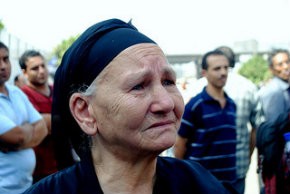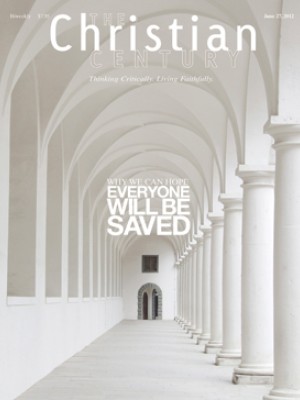Hard choices in Egypt: Will Christians vote for the old regime?

Coptic Christians, who constitute about 10 percent of Egypt’s population, were in a unique position to influence the first round of the presidential elections on May 23–24, the first election ever in Egypt without a predetermined outcome. It appears that they sided primarily with a representative of the old regime.
The top two vote-getters were Ahmed Shafik, who was appointed prime minister by Hosni Mubarak in a last-ditch effort to save his position, and Mohamed Morsi, the candidate of the Muslim Brotherhood. With Morsi and Shafik set to compete in a runoff election June 16–17, the election seems drawn as a competition between the old regime and the Muslim Brotherhood.
Read our latest issue or browse back issues.
Morsi and Shafik each advanced with about 24 percent of the total, edging out Hamdeen Sabahi, who finished third. Sabahi is a long-standing opposition figure and a moderate socialist and Egyptian nationalist. As the centrist candidacies of Abdel Moneim Aboul Fotouh and Amr Moussa waned, Sabahi’s popularity exploded, especially among the youth, including many Copts. Fotouh is a former Brotherhood member who sought to be a bridge between Islamists and liberals. He attracted some Copts until receiving the endorsement of ultra-conservative Salafi groups, which scared many away. Moussa is a former foreign minister who fell out of favor with Mubarak, which increased his credibility. He attracted Copts who were sympathetic to the revolution but wary of drastic changes.
Youssef Sidhom, editor-in-chief of the Coptic newspaper Watani, estimated that about 60 percent of Christians voted for Shafik, 30 percent for Sabahi, and 10 percent for Moussa. As the votes were counted, one Sabahi campaign activist lashed out at Christians, claiming that they killed the revolution. He was quickly quieted down.
Yet is the charge true? Did Copts vote solidly for the most counterrevolutionary candidate? One must also ask: Did they feel the threat of the Brotherhood compelled them to make this decision?
For Sidhom, the choice has become clear. “The revolution is now in the hands of political Islam, and Copts must make a bitter choice to support the civil state. I expect Moussa’s supporters will easily shift to Shafik, but how will we be able to convince the youth, who were so dedicated to the revolution, to do so as well?”
The youth may be hard pressed to follow his line. Bassem Victor is an Orthodox activist and one of the few Copts who have sought to bridge the gaps between the Coptic and Salafi communities. He boycotted the election and expects to boycott the run-off as well. “I cannot vote for Morsi and his Islamist project,” he said, “nor can I bring myself to vote for an old regime figure because of all the sectarian incidents over the past 30 years, in which no one was brought to justice.”
Joanna Azmi is a Protestant activist who expresses both confusion and disappointment at the result of the vote. “I don’t know why the Copts supported Shafik; they are looking for stability. I don’t know if the revolution was even that important to them. I don’t know what to believe about Shafik either, but Copts are very afraid, and they have always been so. Plus, they often simply follow the herd in what their community thinks. It decided on Shafik, and that was that.”
Boutros Salim, deputy patriarch of the Coptic Catholic Church, denies that characterization. “The church from the beginning said it was neutral to all candidates, encouraging each person to vote as their conscience dictates. We want a civil state, and the Brotherhood has said a number of times they do also, that there is no religious state in Islam. So I cannot reject an Islamist for being an Islamist, or a member of the old regime simply because he is one. I support the principles of freedom and human rights, and those who support them. I believe this is the same stance taken by all Egyptian denominations.”
Bishop Mouneer Anis of the Anglican Episcopal Church, who endorsed no candidate, said he understands why many Copts would vote for Shafik, especially in his opposition to the Muslim Brotherhood. “I think Copts will not vote for Morsi because they have failed to receive any encouraging signs from Islamists. After months in parliament [the Islamists] never opened the Coptic file.” Anis said that parliament “investigated the Port Said massacre [where dozens were killed at a soccer riot], and were right to do so. But they did not touch Maspero [where Copts were killed by the military while protesting] or Alexandria [where a bomb exploded at a church three weeks prior to the revolution].
“For all these reasons there is distrust among Copts of the Muslim Brotherhood, who made no effort to build this trust except to say the Islamic Shari‘a guarantees non-Muslims their freedom. But these are words, not actions.” As it happens, “Actions, not words” is the campaign slogan of Ahmed Shafik.
Despite church officials’ stance of nonendorsement, Paul Anis, head of the Catholic Comboni Mission in Egypt, described interdenominational meetings organized by laity at which church leaders presented their views. “These meetings discussed all options and all candidates; even Aboul Fotouh came once. But in the end, they emphasized Shafik, though without binding this choice on anyone.”
Nevine Girgis is an Orthodox member of the women’s committee of the Social Democratic Party and is keen to avoid Islamist control of the presidency, especially in light of legislation in parliament to limit women’s rights. She analyzes Shafik’s supporters this way: ‘There has been flak in the media about Copts voting for Shafik, but many people backed him as a utilitarian choice to support the military against the Islamists. People are very depressed as citizens—as Egyptians—rather than as Muslims or Christians.”
Fayez Ishak, pastor at Kasr el-Dobara Presbyterian Church near Tahrir Square, the largest Protestant church in the Middle East, said, “The Muslim Brotherhood is trying to show that Christians betrayed the revolution, but Shafik gained most of his votes in Islamist dominated areas, such as the Nile Delta, not ones with large Christian populations.”
The Christian community of Egypt finds itself between the rock of the old regime and the hard place of rule by the Muslim Brotherhood. It appears likely they will choose the rock.






